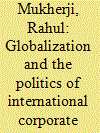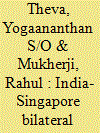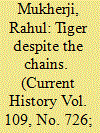|
|
|
Sort Order |
|
|
|
Items / Page
|
|
|
|
|
|
|
| Srl | Item |
| 1 |
ID:
051467


|
|
|
|
|
| Publication |
Jan-Jun 2004.
|
|
|
|
|
|
|
|
|
|
|
|
|
|
|
|
| 2 |
ID:
017562


|
|
|
|
|
| Publication |
July-Sept 2000.
|
| Description |
46-50
|
|
|
|
|
|
|
|
|
|
|
|
|
|
|
|
| 3 |
ID:
052505


|
|
|
|
|
| Publication |
April 2004.
|
| Summary/Abstract |
Globalization spurred by information and communications technology could erode the ability of states to tax corporations. Digitization makes it easy to penetrate foreign markets without the need for physical presence in the buyer's country. This phenomenon has generated debates on the salience of source- versus residence-based taxation, and the definition of permanent establishment. There is no multilateral organization governing international corporate taxation. The article notes both the inadequacy of unilateral approaches and the need for a global approach to setting and monitoring standards. Consistent with the interests of producer developing countries like India, it commends the vitality of source-based principles and the traditional conception of permanent establishment. India's interests are similar to those of many capital-scarce producer countries exporting their services over the Internet. Moreover, they are not antithetical to the interests of capital-abundant countries. The issue area is in dire need of global governance.
|
|
|
|
|
|
|
|
|
|
|
|
|
|
|
|
| 4 |
ID:
134500


|
|
|
|
|
| Summary/Abstract |
India's behavior in the global economy has transformed considerably, consistent with its embrace of economic globalization and deregulation since 1991. Until then, India had practiced a type of economic engagement that Stephen Krasner (1985) characterized as structural conflict. Its capacity to tax citizens was dismal. Its trade as proportion of gross domestic product (GDP) hovered around 16% in the 1980s, impeding growth. And, economic resources were redistributed authoritatively rather than through trade. India, like many developing countries, was locked in economic conflict with the West until the 1980s. Since then, it has embraced global economic integration, contributing to surging economic growth. An economy that grew at an average of 3.5% between 1956 and 1975 has grown at more than 6% since 1980 and over 7% since 2004. India is one of the fastest growing economies in the world after China, and the gap between the two countries is shrinking.
|
|
|
|
|
|
|
|
|
|
|
|
|
|
|
|
| 5 |
ID:
108008


|
|
|
|
|
| Publication |
Cambridge, Cambridge University Press, 2011.
|
| Description |
xii, 201p.
|
| Standard Number |
9781107020276, hbk
|
|
|
|
|
|
|
|
|
|
|
|
Copies: C:2/I:0,R:0,Q:0
Circulation
| Accession# | Call# | Current Location | Status | Policy | Location |
| 056300 | 954.05/GAN 056300 | Main | On Shelf | General | |
| 057644 | 954.05/GAN 057644 | Main | On Shelf | General | |
|
|
|
|
| 6 |
ID:
099740


|
|
|
|
|
| Publication |
New Delhi, Oxford University Press, 2010.
|
| Description |
x, 460p.
|
| Standard Number |
9780198069676
|
|
|
|
|
|
|
|
|
|
|
|
Copies: C:1/I:0,R:0,Q:0
Circulation
| Accession# | Call# | Current Location | Status | Policy | Location |
| 055361 | 330.954/MUK 055361 | Main | On Shelf | General | |
|
|
|
|
| 7 |
ID:
142263


|
|
|
|
|
| Summary/Abstract |
This paper is a critical historical analysis of the trajectory of geo-political and economic relations between India and Singapore. This paper argues that India’s perception of its interests and its geopolitical orientation towards the Cold War prevented India’s security and economic integration with Southeast Asia. Apart from geopolitics, the economic orientation of India was also a critical factor that influenced the trajectory of India – Singapore economic engagement. However, there was a dramatic change after the Cold War ended. The structural change from bi-polarity towards a unipolar moment transformed both geopolitics and economic engagement. Moreover, India’s own economic orientation had also changed by the end of the Cold War. In sum, this paper attempts to elucidate upon how ideas construct economic and political interests and how geopolitical interests, once constructed, drive economic relations.
|
|
|
|
|
|
|
|
|
|
|
|
|
|
|
|
| 8 |
ID:
165082


|
|
|
|
|
| Summary/Abstract |
This series of papers on Globalization, Institutional Change, and Politics of reforms in India highlights some of the key characteristics of institutional change and globalization in India. This special issue points in the direction of three important conjectures on globalization and change by bringing together a few key aspects of the process of institutional change and engagement with the global in India. First, India’s liberal democracy has embraced globalization and globally influenced institutional change in an embedded liberal way. Second, this is a saga of gradual and largely endogenous change. India is deeply affected by the demonstration effect of global best practices but builds rather more after its own internal consensus. Finally, even though India is not a classic developmental state, the state is an important factor in promoting change.
|
|
|
|
|
|
|
|
|
|
|
|
|
|
|
|
| 9 |
ID:
058933


|
|
|
|
|
| Publication |
Oct 2004.
|
| Summary/Abstract |
This essay compares institutional reform in two key infrastructure sectors: telecommunications and power. While reform in India’s telecom sector was relatively successful, the power sector fared much less well. Why? To be sure, reforming power tariffs presented more political obstacles than did regulating telecom pricing, but this does not fully explain the divergent outcomes in the two sectors. This paper argues that successful reform in the telecom sector resulted from its reliance on a “homegrown” approach, itself inspired by ideational changes within the prime minister’s office. This helped reformers to devise reforms that would attract private-sector investment. The power sector depended on World Bank ideas to a much greater extent, making it difficult to instill regulatory confidence among private-sector actors. The other key variable explaining the differing outcomes was institutional: whereas India’s constitution confers responsibility for the power sector to state governments – indeed, state-level regulators were established alongside their central government counterpart – telecommunications is almost entirely a central government competence. Thus, facing fewer coordination problems, telecommunications was a more conducive sector for institutional reform. The paper concludes by arguing for strengthened, yet accountable, regulators in both sectors.
|
|
|
|
|
|
|
|
|
|
|
|
|
|
|
|
| 10 |
ID:
087515


|
|
|
|
|
| Publication |
2009.
|
| Summary/Abstract |
The Indian state has been more penetrated by social actors than many
East and Southeast Asian states. Unlike China, India could neither
abolish private enterprise nor could it embrace globalization with the
same speed and ferocity. Both complete state-driven nationalization
and state-driven globalization would demand a state, which would
have much greater command over interest groups like industrialists,
farmers and trade unions. Policies favoring economic growth and
development in India needed to evolve gradually after building a
social consensus on those policies. This is a model of development
driven by a relationship between the state and society, where the
power of the state, even in its commanding moments, was moderated
by the power of social actors.
Developmental ideas were debated within the state. Substantial
economic policy change would require building upon a historical path
of gradual changes in ideas and policies, punctuated by economic crises.
This paper demonstrates how this dynamic is critical for explaining
the politics of the green revolution and consequent self-sufficiency in
food grains, as well as for understanding the India's globalization
beyond 1991. It is a story of getting to higher rates of economic
growth in a gradual and circuitous way after building a policy consensus
among diverse stakeholders. Economic crises aided the arrival of a
new consensus.
India's growth rates began looking more like China's after 2003.
Figure 1 gives us a visual feel of the trajectory of India's growth.
Between 1956 and 1974, India's GDP grew between 3 and 4 percent
per annum, when it was a closed and highly regulated economy.
|
|
|
|
|
|
|
|
|
|
|
|
|
|
|
|
| 11 |
ID:
093938


|
|
|
|
|
| Publication |
2010.
|
| Summary/Abstract |
Powerful political interests still stand in the way of India's realizing its economic potential.
|
|
|
|
|
|
|
|
|
|
|
|
|
|
|
|
|
|
|
|
|